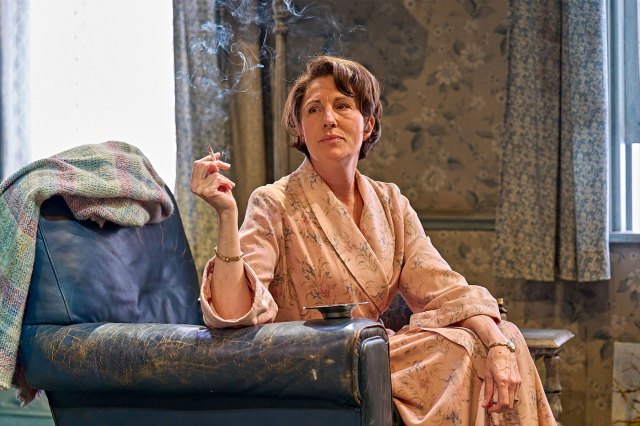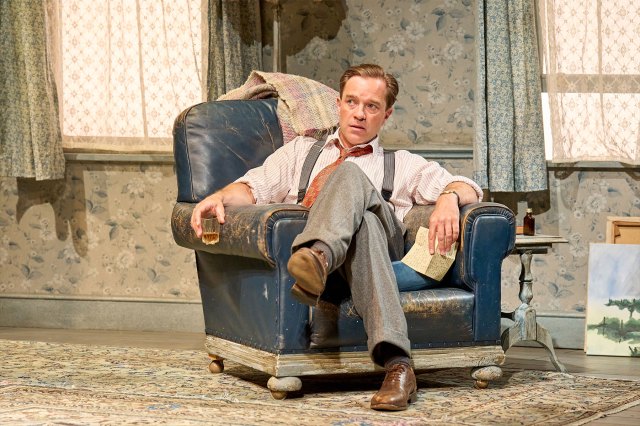The Deep Blue Sea with Tamsin Greig review – a five-star triumph
Lindsay Posner’s revival has transferred to Theatre Royal Haymarket, where it plays until 21 June

Terence Rattigan’s The Deep Blue Sea is a work of genius. Inside its well-made frame, it holds such intense feeling. It’s like a pearl filled with lava, its shiny surface containing a seething heart.
This revival, starring Tamsin Greig, slightly recast since it was first seen in Bath last year, understands the tensions that lie within it. It is both decorous and deeply sad, a study of the inequality and unfairness of passion that is both utterly gripping and entirely truthful.
Rattigan wrote the play in 1952, three years after his former lover Kenneth Morgan killed himself by lying in front of a gas fire. Morgan had left Rattigan for another actor, and the playwright’s tangled emotions about him find their way into a work that begins with Hester Collyer, wife of a judge, trying to kill herself in front of a gas fire in the dingy flat she shares with her lover, the disillusioned pilot Freddie Page.
There’s always been a lot of chat about whether Rattigan wrote The Deep Blue Sea as a homosexual play and then turned it straight, but in a sense that is besides the point. What’s so astonishing, so moving about the work – the quality that turns it into a classic – is that Rattigan writes himself into the characters with exceptional empathy. He identifies with them all.

Director Lindsay Posner offers a straightforward but sensitive production, designed by Peter McKintosh in an all too convincing boarding house, with faded walls, battered furniture and dingy light. Over the course of 24 hours, Hester and Freddie move from despair to hope to anger to a tiny glimmer of resilience. “We are death to each other”, he cries, revealing remarkable insight as he announces his intention to leave.
Greig makes you feel every ounce of Hester’s desperation as she clings to a man she knows she doesn’t love her and is unable to match the feelings he has unleashed in her. The timing she has honed over years as a comic actress makes her a fine tragedian; the bite of her response to the neighbours who come to know her business, the resignation of her knowledge that Freddie “loves me exactly as much as he did months ago.”
In a neat red dress, hands carefully folded, she exactly embodies the clergyman’s daughter who – in Freddie’s cruel words – “married the first man who asked her and fell in love with the first man who gave her the eye.” She’s unfailingly polite, suppressed, which makes the depth of her emotions, at first glimpsed and then nakedly unrestrained, all the more upsetting. Her frozen face when he kisses her goodbye is devastating.
As Page, a man “whose life stopped in 1940”, Hadley Fraser is returning to a role he first played opposite Nancy Carroll in Chichester six years ago. Time has deepened his approach: this Freddie is less callow, more knowing than some, softening his petulance and swagger into an almost-tenderness which helps you understand why Hester fell for him in the first place.
They are matched by Nicholas Farrell, who turns the figure of Hester’s judge husband William into a softly-spoken, bemused figure, broken just as much as the others by the passions washing around them. And as Mr Miller, the struck-off doctor, who saves Hester’s life twice, first with his medical skill and then with his advice and friendship, Finbar Lynch creates a wonderfully complex figure, isolated but humane and funny.
You could hear a pin drop in the auditorium throughout. It’s a terrific production that reveals the extraordinary power in this slightly old-fashioned play that has outlasted many more modish works.
















